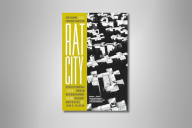You have /5 articles left.
Sign up for a free account or log in.
One of the most durable metaphors used in making sense of the world treats social life as a kind of theatrical performance. Each of us is playing a part -- more or less comfortably, more or less convincingly -- while burdened, often enough, by the need to improvise "in character."
This idea is more than a Shakespearean conceit. It's implicit in the sociological notion of "role," for example. And it also helps make sense of what happens when people learn to play that type known as "the professional" -- a much-sought social role, usually accompanied by substantial benefits in
income, and even more in prestige.
How people rehearse that character is the topic of Carrie Young Costello's Professional Identity Crisis: Race, Class, Gender, and Success at Professional Schools (Vanderbilt University Press). Costello, an
assistant professor of sociology at the University of Wisconsin at Milwaukee, takes on the thorny topic of why women and people of non-Caucasian ethnicities who enter professional schools with solid academic records often tend to underperform. She did extensive field research among first-year students enrolled in the law and social-work schools at the University of California at Berkeley.
Costello finds that there is an undeclared yet unmistakable WASP accent to the professional roles that students are training to acquire. Along with technical expertise, they have to assimilate the necessary demeanor and attitude. For students of some backgrounds, that presents no real difficulties -- so they can, as Costello puts it, "focus on the intellectual tasks of professional school with little distraction." But for those with "a mismatch between the personal identities they possess upon entering their professional programs and the professional roles those schools proffer," there can be a jarring dissonance. "Seeking to find a way to manage or resolve their identity dissonance distracts students from focusing on their studies," writes Costello.
Race and gender aren't the only factors making for identity dissonance in professional schools; so is strong religious commitment. "Particularly at risk in my sample were evangelical Christian women who used a 'what-would-Jesus-do' standard to guide all of their behavior and decisions," notes Costello, "but students from other religious backgrounds whose religious dictates took precedence over other commitments could also be at risk."
Costello's book is an interesting study in the ethnography of higher education -- and her analysis of the implicit cultural signals sent by how law and social-work professors dress will raise some eyebrows, especially around UC-Berkeley. I contacted her by email with a few questions about her research.
Q: How did you come to this project? That is, what combination of previous interests and personal motivations led you to want to study professional identity and its discontents?
A: The question of why patterns of social stratification emerge during professional schooling is one that has interested me ever since my own experience at law school. I went to law school at Harvard, and every fellow student I encountered was a longstanding overachiever with sterling qualifications. Nevertheless, by the end of the first ("1L") year, it was easy to look at the class standings and see that males received a disproportionate share of good grades when compared to females, and that white students did disproportionately better than did students of color.
This pattern of grade stratification was a topic of perpetual debate among my peers. Students of a liberal bent cried that there was a professorial conspiracy in favor of white men, while socially conservative students claimed that affirmative action promoted people beyond their real intellectual capacities. Each side could poke holes in the other's argument. White men outperformed others in classes taught by notoriously liberal professors. Students of color who had omitted information about their race and ethnicity on their applications and could not have benefited from affirmative action nevertheless underperformed. The debate was interminable.
When I returned to school as a sociology doctoral student, I reconsidered the question of social stratification in professional programs from a new perspective. I learned from sociology of the professions that professional students have two tasks: one, that of "mastering" the intellectual substance matter of their professions, and the second, that of internalizing an appropriate professional identity. The "folk" debate I encountered at law school had only considered the first, intellectual task. I wanted to study the second, identity-based task to see if this could more satisfactorily explain why patterns of social stratification re-emerge during the course of professional schooling.
Q: You set things up by doing parallel studies of law and social work. In what sense is it accurate or meaningful to subsume them under the same term?
A: The way that students are socialized in law school and in a social work program are indeed different in many ways. I'll give a couple of examples:
Class privilege and income expectations: Students in M.S.W. programs are socialized to expect a workplace and lifestyle of modest means, while students at law schools are socialized to have high expectations of wealth. At the professional schools I observed, the built environments of the two schools sent very disparate socializing messages regarding wealth expectations. The eating facilities provide an example: at the school of law, a lovely continental cafe provided gourmet foods and coffee beverages, while at the school of social welfare, a basement room held three vending machines protected by steel grilles.
Empathy: Not surprisingly, given that social work is deemed a "caring profession," students in M.S.W. programs are trained to cultivate empathy. For example, I observed that professors warned students to be careful of the potentially hurtful nature of humor, and modeled an earnest solemnity to their classes. At law school, on the other hand, professors deployed sadistic humor with relish. Not merely failing to cultivate empathy, law professors trained students to demonstrate a callous disregard for others' feelings, beaming at students who made cruel jokes of their own while answering questions -- particularly if the most sensitive members of the class were wincing.
Having acknowledged that two professions socialize their students differently, what is I believe more striking is the similarity in outcome. That is, at both schools of law and schools of social work, men do better than women, white students do better than students of color, those with class privilege do better than those without it, etc. One might expect that since social work was created to be a "feminine profession" that men would underperform in M.S.W. programs, but this does not prove to be the case. Rather than hitting a glass ceiling, men ride a glass elevator to the top of the class.
Q: What do you make of the professional-school success rates for Asian and Asian American students who presumably do not, for the most part, grow up absorbing the complex of attitude and demeanor one associates with WASP/bourgeois dominance?
A: Actually, one of the ways in which you can see the power of the effect of professional identity is by looking at the success of Asian and Asian American students. In American high schools, students from many (but not all) Asian backgrounds outperform other students of color, and perform at least as well as white students. In college, Asian American students also do well, although their grades drop somewhat from their high school levels.
But in professional schools, the picture is quite different. While Asian graduate students in the sciences often excel, Asians underperform in many professional school settings, including both law and social work. While these students are able to do very well in prior schooling, the academic skills they have developed are insufficient to secure them success, because they are not able to internalize an appropriate professional identity with the ease of their WASP peers. Their professors often saw them as too reticent, as not taking sufficient initiative, as insufficiently creative, etc.
Q: There is the professionalization undergone by people going into law, medicine, and certain other fields (i.e. professions, that have clients), on the one hand. And then there is academic professionalization. Have you given any thought to the similarities and differences between them?
A: Being a professor is indeed considered a profession, and academics face professional socialization. This is what, for example, makes so many first-year graduate students feel uncomfortable in their seminar classes. They may feel that their contributions to discussion are inadequate, and be unsure of why this is so. They may try to improve their performance by spending hours reading and preparing, and still find their comments falling flat. The problem is not one of intellect, but one of habitus, although few understand this. The approved habitus varies between academic departments -- just compare a roomful of English dissertators with a roomful of economics doctoral students. But the basic process of needing to acquire both a knowledge base and a professional identity is consistent across disciplines. This contributes to the disproportionate success of white men in academia.
Q: You indicate that it would be a step forward if the problem of professional identity dissonance were addressed head-on, perhaps through a course that would explicitly address professional socialization. At the same time, you seem to think that the effects would be very limited -- that, in the absence of some very substantial social change, the deck is hopelessly stacked. Or is there some element of optimism in your work that I've missed?
A: I believe that if the issue of professional socialization were made overt, it would definitely help. At a minimum, it would do two things: force professional schools to acknowledge the problem, and help professional students to realize that they are suffering from identity dissonance. However, you are correct in that I don't see a swift solution to the problem.
I give the example in my book of an exercise I do with the students in my gender class. I ask for a male and a female volunteer to come up onto the stage. I then ask them to walk across the stage with the manner of a member of the "opposite sex." Campy performances ensue to general laughter. Then I tell the volunteers to imagine that their children have been kidnapped by terrorists, and that the only way to get them back will be to successfully pass as a member of the other gender as they walk across the stage. This time, the students try with very serious expressions on their faces -- and no more success.
The problem with wanting to change one's habitus is that it is an unconscious phenomenon, not subject to conscious control. It is no simple thing to change one's tastes, gestures or worldview. Furthermore, doing so alienates one's community of origin and fundamentally changes who a person is. So no, I don't expect a quick fix. But at least schools would have to decide whether they are willing to say that to become a professional, students must, for example, give up their ethnic or regional accents. And professional students could decide if that sort of change is a price they are willing to pay for mainstream
professional success.








